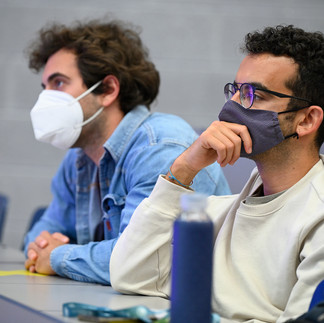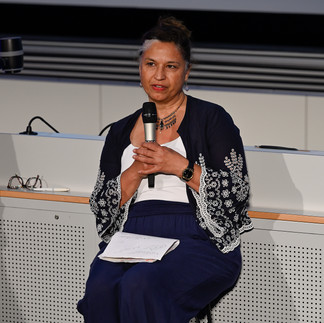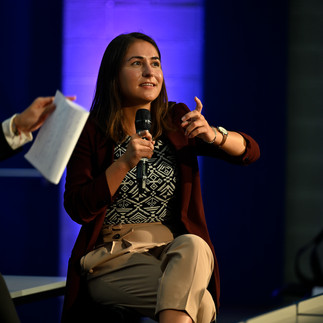Roundtable: Pathways for More Inclusive Economics Departments - What Works and What Doesn't?
- Rare Voices In Economics
- Sep 5, 2021
- 5 min read
Updated: Oct 4, 2021
As part of the Rare Voices in Economics Conference, Women in Econ Léman hosted a roundtable discussion titled “Pathways for More Inclusive Economic Departments – What Works and What Doesn’t?”. The Roundtable brought together the voices of two established professors in economics, Professor Emmanuelle Auriol from Toulouse School of Economics, and Professor Estefania Santacreu-Vasut from ESSEC Business School, and the voice of a Professor of Sociology, Professor Heidi Safia Mirza from Goldsmiths University of London, University College London and LSE. The panellists discussed the inclusion of women and other under-represented groups in their departments, taking a forward-looking view and assessing what has been tried before and what should be done next. During the discussion, the panellists reacted to questions of the moderators, Women in Econ Léman co-founders Laura Nowzohour and Federica Braccioli, and the public, drawing out key and important themes ranging from the defining of safe spaces, to a reconsideration of our metrics and measures of ‘success’, practical views on the role of mentorship and allyship, mechanisms for change both from the leadership and from below, and the politics and practical dynamics surrounding ‘representation’ in academic spaces.
The opening address, delivered by CEPR President Professor Weder di Mauro, highlighted the importance of strong networks in fostering inclusion for women and the importance of the current event for creating such networks. The theme was picked up throughout the discussion, drawn out by each of the panellists who focused on different aspects of the network and its role. The notion of ‘mentoring’ was referred to by Professor Auriol as being a key and important mechanism for successful inclusion of women. Professor Mirza highlighted the importance of allyship within economic departments, to support women (and other excluded groups) in getting a foothold. Professor Mirza also highlighted the importance of creating networks within the student body who are willing to support one another and, crucially, read each other’s work in a bid to counter the neoliberal individualism of the academic profession. Professor Santacreu-Vasut spoke of harvesting the power of these student networks through informal metrics by which reputational aspects relating to an institutions ability to support and include women are formalised into performance metrics for the institution. This suggestion linked with comments made by Professor Mirza that the weakness of institutions, endowed with so much institutional power and advantage over women and minorities, are very vulnerable in relying heavily on their reputations. She describes this as the ‘weak point’ of institutional strength. However, within this debate concerns surrounding networks were also raised. Professor Mirza highlights that, while creating a small network can be valuable, it must be remembered that much of the opportunity in economic departments arises due to ones connection with larger and more established networks. Similarly, all speakers highlighted the overburdening of women that occurs, as well as the discrimination cost, inherent in requiring women to mentor and lead and support younger students alongside their work.
Linked to the network idea was the discussion on representation within academic departments. While it was highlighted that representation was a powerful and important tool, there was also a dark side. Professor Auriol began by introducing the importance of seeing other women represented in academic departments, while also discussing the general distaste for a ‘quota’ which was a concern shared by all panellists. It was argued that creating a quota system for women may place disproportionate burden on female academics: if a woman is required to be on every committee while there remains few women in the department, each woman receives an increased workload compared to male counterparts. At the same time, this concern was balanced against the need for representation, especially in decision making spaces, where the mere presents of a woman has been found to alter performance of a whole committee of men.
A further issue discussed at length in the panel was that of metrics and performance measures. such that departments may utilise a less gendered expression of what ‘success’ looks like. While other discussions had focused on increased hiring of women and representation in the profession, this metric looked instead to the recognition of women once hired. Professor Santacreu-Vasut spoke on how women tend to work in areas that are less recognised, publish at a lower rate, and suffer the ‘cost of discrimination’ throughout their career. However, gender often shapes the formulation of a research question or the focus of research such that diversity increases the quality of output. The measures of success are also linked with the fact that there remain only five key journals of importance in the economics space; thus, where the number of economists publishing has increased markedly, the lack of journal space has created an increased competition. Professor Mirza expanded on this topic by reviewing the notion of peer review and the centrality of this form of quality control, arguing that while it is a measure of quality, it is also a mechanism for enforcing and policing academic boundaries shaped by established academics and restricting the emergence of new ideas.
A topic that garnered attention both from the panel and the audience was the idea of ‘safe spaces’ and their creation within academic departments. Professor Mirza spoke of the great deal of discussion surrounding safe spaces and their importance for inclusion, both for women and minority groups. An audience member asked the question ‘how do we square the need for ‘safe spaces’ with the academic process involving debate, disagreement, and challenge’, noting that this process is a fundamental part of all of our jobs. The discussion turned to the tendency with which those with offensive opinions become the ‘victims’ when called out for offensive behaviour shifting the focus from the harm caused, to the rights of the speaker. The discussion finished with the contribution that, counter to the idea that safe spaces stifle academic debate, the creation of safe spaces encourages debate by creating a room in which all members are free to share and openly present ideas free from personal attacks or notions such as ‘you only hold that opinion because you are a woman’.
While the discussion addressed difficult issues, with moments of frustration at the slow progress of change expressed by the panelists, the discussion ultimately rendered a sense of overall progress combined with concrete and hopeful suggests for the future. Criticisms of current systems were present but were scattered among an extensive series of practical suggestions. The discussion was paired with proud callouts to the young, particularly female, economists making waves in the field both for the cause of inclusion and in an academic sense.

Photographer: Eric Roset






































































































































































































































































An online cricket ID allows users to place wagers on live matches, test series, T20 leagues, and even domestic tournaments directly from their smartphones or laptops. On the other hand, an online betting ID extends beyond cricket—it connects players to a wider universe of online gaming that includes football, tennis, kabaddi, and casino games. In 2025, many betting platforms have shifted toward multi-sport integration Visit For Laser247 ID : https://goldbettings.com/
Fairplay offers a comprehensive sportsbook with hundreds of daily betting options. Fairplay Login Indian players can explore live and Fair play pre-match odds across major tournaments, such as the ICC T20 World Cup, IPL, Premier League, and UEFA Champions League. Fairplay live casino section offers a wide collection of table games hosted by professional dealers. Visit: https://fairplayslive.com/
Playkaro is a rapidly growing online gaming and betting platform that brings together casino entertainment, sports wagering, and fantasy gaming. Playkaro Login Accessing your account on Playkaro is simple and secure. The Playkaro App is Available for both Android and iOS devices, it’s optimized for fast loading, easy navigation, and uninterrupted gameplay. Playkaro365 offers a seamless and secure environment where users can enjoy popular games such as Teen Patti, Andar Bahar, Roulette, Slots, and Aviator.
Visit: https://playkaro.games/
Fairplay Pro is one of the most trusted and versatile online gaming and sports betting platforms catering to Indian users. The Fairplay Pro login process is designed to be fast, secure, and hassle-free. The Fairplay Pro App takes convenience to the next level by allowing users to enjoy the full platform experience on their smartphones. Players are encouraged to download the official FairplayPro directly from the Fairplay website to ensure safety, authenticity, and the latest features.
Visit: https://fairplaypro.co.in/
An online cricket ID allows users to place wagers on live matches, test series, T20 leagues, and even domestic tournaments directly from their smartphones or laptops. On the other hand, an online betting ID extends beyond cricket—it connects players to a wider universe of online gaming that includes football, tennis, kabaddi, and casino games. In 2025, many betting platforms have shifted toward multi-sport integration Visit For Laser247 ID : https://goldbettings.com/